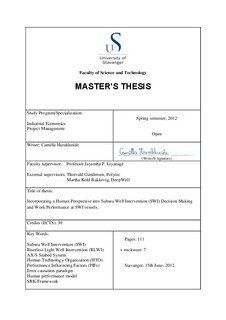| dc.description.abstract | The key to maintaining well integrity, minimizing production decline and improving recovery efficiency, is to provide well services to the subsea wells (Lonnes, Williams and Burleson, 2009). The Subsea Well Intervention (SWI) industry is a specialized segment of the petroleum industry, and represents a very complex work setting in the offshore environment. The RLWI (Riserless Light Well Intervention) and AX-S are two different types of SWI concepts studied in this thesis. RLWI has been used for decades, while AX-S is still in the commercial phase. The RLWI vessel Island Constructor and the AX-S vessel Havila Phoenix was chosen as the study basis.
The SWI concepts may face challenges due to Human-Technology-Organization (HTO) factors which may cause consequences that might affect the decision making, work performance, safety and organizational goals. The purpose of this thesis is to present the methods for identifying and analyzing the challenges which may affect decision making and work performance at SWI vessels, from a human perspective. The Performance Influencing Factors (PIFs) and error causation paradigms with reference to the human performance model were used to present and identify the challenges based on the collected data from the interviewed SWI personnel. The thesis is a contribution to increase the focus on the wide range of factors that affect decision making and work performance from a human perspective, and it also shows that every factor may introduce different effects and consequences. Challenges within areas like the environment, panels and alarm, information processing, communication, procedures, manning, competence, planning, management, individual and motivation were identified.
A proper knowledge and analysis of the complex work settings, from a human perspective, can give the personnel a safer and better working environment and an opportunity to improve their decision making and work performance. By providing the challenges presented in this thesis, I believe that it can contribute to improve the decision making and work performance conditions at the vessels performing SWI, together with an achievement of a safer and more productive operation. By conducting further studies within the HTO area combined with implementations of proactive measures, can from my point of view result in a complete “best decision making and work performance practice” for the different SWI concepts performing complex operations. | no_NO |
